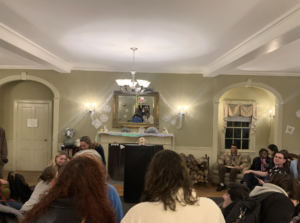Michael Jackson’s “Billie Jean” never ceases to stir me, tear me, rip me. The heartbeat of the intro lulls me into a drunken stupor, until the echoed “chikachaaa” fades in and out, crossing my mind from ear to ear reminding me that to listen to its wisdom properly, I need to stop and give it the undivided attention it deserves. It glides with signature Jacksonian non-elegance with that brazen boneless body in decadent clothes in sonic form. Nuanced, expansive, layered, the vocals range from a stifled moan of a whisper to the hot sweat-and-blood sizzle of that bridge connecting the verses to that ever-holy and unholy, all known and knowing chorus. The song is bacchanal, intoxicating, hot, surly, slippery, lucid, grinding, banal, sexy; “Billie Jean” brings the same energy it contains out from within me. Growing up around his music, I knew from a young age why he was deserving of that self-titled mantle “the King of Pop.”
But later, when I learned more about the allegations of conspiracy, lewd acts, and child molestation, the elusive, shifting appearance, the side-show drama of his life colliding with the more-digestible equally spectacular stage presence, the feelings I would get when listening to Michael Jackson grow almost guilty. As I heard the rhythms, the well-struck sweet-and-salty chords, the impossible, glaring vocals, I felt a twang of displeasure. How did the “King of Pop” fall so far from his throne, crown scuffed, into the realm of non-existence—or, more accurately, a poltergeist-esque presence riddled with the drama and intrigue of a glass-breaking specter, making noise no one wanted to hear—committing acts of violence without remorse?
Margo Jefferson’s On Michael Jackson is less biography, and more reckoning: with Jackson, the media, his family, his accusers, and the politics surrounding and embedding itself with a tick-like hunger in our vision of Michael Jackson. In a slim 138 pages, she takes us through the very making of the King of Pop in a side-show ring-master glamor. More so, she treats him as performance in a continuum, touched by childhood trauma and exploitation, visiting the life and social-death of Michael Jackson through the lens of multiplicity; the child star, the son, the gender-fluid muse of eros, the migrant of racial divisions (physically and artistically,) and—with a climactic sweep fitted with a main “cast”—the child molester.
She leads us through the spectacle of Jackson’s life; in her tour, we see a case study of abuse and exploitation, the predatory nature of adults on the bodies and souls of children, and the insatiable lust that comes from this raw material.
“Children embody the innocence he was denied,” she writes, as a result of being “force-fed…social and sexual rules” by an abusive father, a martyred, leeching mother desperate for “unconditional love” in a loveless house, and a music industry treating young Jackson as a “sex toy” for listeners with the soulless prospect of making a profit. His virtuosity is corrupted at the expense of their gain, and he is forced to relive his traumas; the child plays sexualized adult, a show that never ends, and the blurring of childhood and adulthood, escape and entrapment, blur together as he dons a multitude of masks (Jefferson reminds us constantly how his transgression of racial and gender binaries are both groundbreaking acts of escaping convention and futile attempts at “self-authorship.”)
The result: “a man who wants to love and who fears sex…trapped in the traumas of [his] childhood…drawn to—moved by—[his] own kind: young boys who have suffered as [he did],” a desperately criminal act of horror. Jackson the Tortured becomes Jackson the Torturer.
Through the multiplicity of Michael Jackson’s being, Jefferson takes on the uneasy task of defogging what we know about the King of Pop, presenting his contributions and crimes as they are. He is a product of predation, and as such, he embodies the nuanced results of a “compulsive [reimagining of] the violation of his own innocence.” The book thus becomes a “panoramic close-up” of mental illness.
With the side-show flair for the dramatic and the formal breakdown in construction and artifice, Jefferson’s stitchwork becomes elegantly encompassing and calculated, deliberate and far-reaching, penetrative in its ability to pierce the same engines that run the economic, social, cultural, and political framework of America, and how these engines birthed Michael Jackson himself.
Moreover, she paints him as the man who lost control of his life and agency since childhood as it was forced away from him, placed in a nebulous of growing and un-growing. There was no end of the stage for Jackson, no ribbon from which he could hang his feet, only the lucid devolution into giver and receptor of pain.
He scrambles to organize the pieces of his shattered self, and as such, becomes multiple, a hydra of personalities. “What does he see?” Jefferson asks:
“A man who wants to be androgynous and beyond race? An artist of genius who has given us acute excitement and pleasure? A willful celebrity who wants everything his way, yet insists that everyone loves him unconditionally? A man driven to shed his identity, while denying what pains him? Our man in the mirror? Or creature we no longer wish to acknowledge?”
More importantly, she does not exonerate Jackson or avoid the accusations. She gives it attention, placing these events under the microscope such that every individual cell is analyzed and pricked at, picked apart and shuffled into the light, made visible and dissected with the ultimate purpose of diagnosing the issue at hand. Her weaving becomes surgical, calculated, planned, studied, and tender; she does not shy away from even the darkest aspects.
Jefferson is a critic at large with this book, an exhumer of mystery, a scholar poised at the ready to deliver the nuances of her topics with care and precision, stitching even the most outlandish and unconnected figments of thought together with delicacy and rhetorical gravitas. She treats Jackson as both human and artifice, tangible and ghostly, criminal and victim.
The atrocities of his life are woven in the book, and Jefferson pushes us as the reader towards a higher plane of understanding, unearthing (without, herself, answering) the impossibilities of Jackson’s; here lie the bits and pieces of what is known, fitted together to grant us a vivid image of Michael Jackson bearing all his masks at once.

Dylan Walawender is a first-year student studying literature and writing.
Book Reviewer, Cultural Examination Columnist, Website Team Member, Journalistic Education Team Member










Be First to Comment